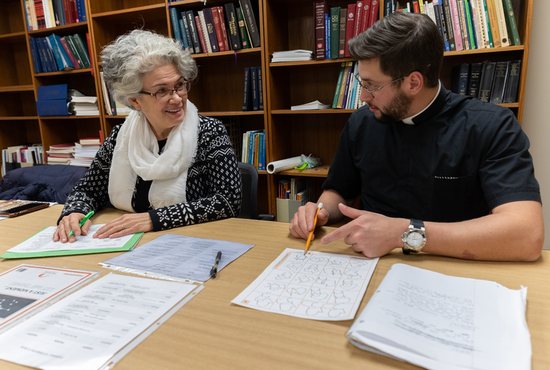
After a prayer, in which she offers her work to God, Dunia Ruff uncovers a sheet of paper covered in small black dots.
“It looks like constellations, doesn’t it?” Ruff asks, inviting her student to approach the paper with a sense of curiosity. Then she reveals that the mysterious conglomeration of points is an intricate puzzle, designed to teach her students how to think.
The cognitive flexibility puzzle is one of many that Ruff uses as she helps seminarians studying in the Archdiocese of St. Paul and Minneapolis who have learning challenges, such as dyslexia and attention deficit disorder.
The approach is the fruit of many years Ruff has devoted to mediated learning, first proposed by Reuven Feuerstein in the mid-20th century. According to the Feuerstein Institute in Israel, which carries on his work, the method presents the educator as a mediator between the student and the task, rather than simply presenting the student with information.
“If you get between the child and the task, you can enhance it and even advance it,” said Ruff. “You ask (the student) questions, you entice the child to look at the task and make the connections.”
After 23 years as a teacher and teacher-coach in the St. Paul public school system, Ruff, 68, a member of St. Mark in St. Paul, now devotes much of her time in retirement to helping seminarians at St. John Vianney College Seminary and The St. Paul Seminary, both in St. Paul.
But Ruff’s work is not confined to the seminaries.
Regina Mancilla, 46, said she met Ruff in 2016 when she moved to the Twin Cities from Guatemala City to continue her work in education. Ruff, who is from Guatemala, helped her navigate the U.S. educational system, and now Mancilla is the director of community engagement at Risen Christ Catholic School in Minneapolis, the only dual immersion (Spanish and English) Catholic school in Minnesota. Ninety percent of its student population is Hispanic, Mancilla said.
Ruff has made her services available at Risen Christ School in a variety of ways. In early 2021, she coached tutors at the school how to engage with students over Zoom. Now Ruff is offering a four-part series to parents of students at the school, delivered in Spanish, which aims to increase parent participation in their children’s education.
“She helps the Spanish community to … understand the great mission that they have as the first educators of their kids, and then how to be better parents through the lens of faith,” Mancilla said.
Ruff also encourages parents to be proud of their cultural heritage, so they can convey the strength that their Hispanic roots bring to their families. In the first session of the four-part series, which was entitled “Raising the children that God has entrusted us,” Ruff asked the parents to tell stories from their childhood.
“It was really amazing to see how much they want somebody to listen to their stories,” Mancilla said. Twenty-five parents attended the first session, she said.
“She is so generous,” Mancilla said.
At the graduate-level St. Paul Seminary, Cullen Gallagher, a 26-year-old seminarian studying for the diocese of Winona-Rochester, has been working with Ruff this year. It has helped him manage his attention deficit and hyperactivity disorder, he said.
“After every session, my brain just hurts,” said Gallagher, who graduated in 2019 from the undergraduate Immaculate Heart of Mary Seminary in Winona and hopes to be ordained to the priesthood in 2026. Between seminaries, he worked for two years as a FedEx delivery driver.
Gallagher, who was diagnosed with ADHD when he was in the seventh grade, said the condition has posed challenges to his schooling, especially in the rigorous academic and liturgical schedule that he maintains for seminary.
Ruff’s work has helped him approach tasks in a way that works with, rather than against, his ADHD, he said. “She helps me learn how to do tasks in a different way, instead of being so single-minded about things,” he said.
Now he splits his notes into sections, which helps him focus on different areas at a time. He also uses breathing techniques Ruff has taught him to focus his mind during a task.
“Dunia is fantastic. She is a saint. She is one of the most gentle and calm people I’ve ever met,” said Gallagher. “I definitely feel more on top of my ADHD now that I am in seminary.”
Gallagher and Ruff meet once a week for about an hour. After a prayer, Ruff presents Gallagher with a task that requires cognitive flexibility. After he completes a given task, which he describes as very difficult, they review what skills he used to solve it, and how he can use those skills in other areas of his life, such as prayer or study.
Gallagher said the skills he has learned from Ruff will help him perform a litany of priestly tasks, such as organizing parish festivals, preparing homilies, and keeping a parish office organized.
Gallagher also meets with Ruff and a group of fellow seminarians once a month, where they reflect on their academic progress as they work with diagnoses like ADHD and dyslexia.
Guatemalan roots
Teaching has been an integral part of Ruff’s life. It is a story woven from her Guatemalan roots.
“Education has always been my natural way,” Ruff said. When she was 14, she began an informal night school for the children of maids in Guatemala City. Although the country had a public school system, children had to have shoes and basic school supplies to attend — which many of them could not afford.
When she was 16, she entered a convent in Guatemala, Hermanas Terciarias Capuchinas, which she left when she was 21, intending to take a brief pause from her novitiate formation. During this time, she began working with children with special needs, became fascinated with the work and decided to pursue it.
At age 26, Ruff came to Minnesota, encouraged by her brother who had been an exchange student in Minneapolis. A large Catholic family she met offered her room and board and a scholarship at St. Catherine University in St. Paul, which allowed her to cover her tuition while working a side job.
She married Paul Ruff, who now works as the director of Counseling Services at the St. Paul Seminary, and was pregnant with their first daughter, Maria, when she graduated from St. Kate’s in 1984. She shelved her teaching career to care for their four children but began working for the St. Paul public school system when she was 41. Her expectations for teaching in the U.S. — where the average child had many more resources than in Guatemala — did not align with what she discovered in the classroom.
“I started noticing, these kids have everything, but they are not learning. Why are they not learning?” she said. “I always felt unsatisfied.”
She began a personal quest to find out how best to instruct the children she served, who came from a wide variety of demographics. It wasn’t until she discovered Feuerstein’s work that she felt like something clicked.
“The paradigm shift happened in my mind: We are teaching, we are not mediating,” Ruff said.
She wrote to the Feuerstein Institute but discovered that at the time, the only training available was in Israel and it was offered exclusively in Hebrew. She decided to gather all the information she could on the method and integrate it into her teaching practices.
Since then, MindCAP cognitive advantage program, which trains teachers in the method, opened in Fort Wayne, Indiana. Ruff has received formal training at the center, most recently in October.
Peter Spect, a 25-year-old seminarian from the Diocese of Duluth, has been working with Dunia at The St. Paul Seminary since 2021. His diocese recommended that he improve his essay writing abilities — a skill that will translate to priestly tasks such as writing parish bulletin articles, he said.
Spect attended a community college in Duluth for two years before attending the Immaculate Heart of Mary Seminary, where he earned a degree in philosophy. Spect said his work with Ruff has been indispensable in elevating his writing skills to the level expected at the graduate-level, major seminary.
The skills he learns with Ruff will also help with a wide range of priestly duties, such as making big decisions in the parish, navigating interpersonal relations, asserting his authority as a pastor, and managing his time, Spect said.
Ruff said her work at the St. Paul seminaries is unique. No other Catholic seminaries in the nation offer the mediated learning approach to help seminarians who might struggle in the classroom, she said. Spect and Gallagher said they think other seminaries would benefit from a similar program, and they would have benefited from Ruff’s work in their minor seminaries.
“Some of us (seminarians) are more academically inclined, some are not,” Spect said. Ruff’s work helps those who are less academically inclined to be successful, he said.
Editor’s Note: Dunia Ruff is a sister-in-law of Joe Ruff of The Catholic Spirit.




